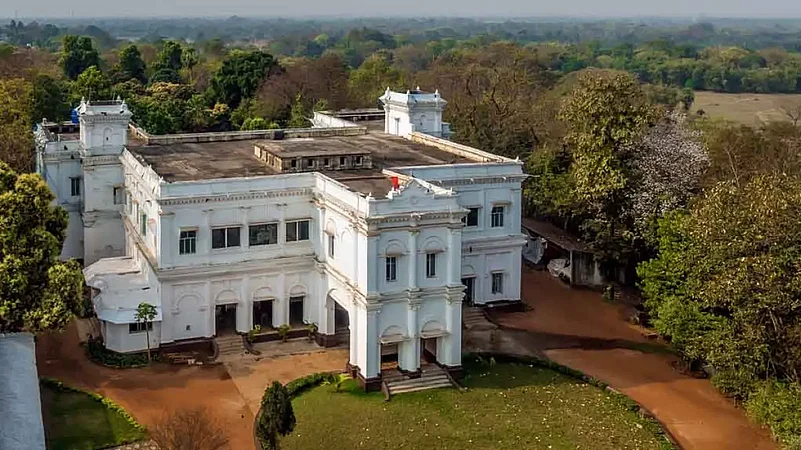All across the world, travellers are choosing to stay in places that give back to their communities in a big way. There are many such instances, and the list will grow in the future as more travellers choose to experience a sense of the place they stay in, and of the community. In fact, one of the issues that have been highlighted by the pandemic is the urgent need for promoting a more sustainable tourism industry. Tourism’s role in climate change adds urgency to this. Many expect the pandemic to transform societies and economies. Can more sustainable forms of tourism help?
Around 3.5-hours from Kolkata, situated on a hill, is the stunning Belgadia Palace. This used to be the ancestral palace of the erstwhile royal family of Mayurbhanj. Now a section has been transformed into a boutique hotel. A blend of Greek and Victorian architecture, courtyards and surrounded by lush greenery, this 18th century Victorian structure was converted into a hotel whereby a percentage of funds are earmarked for use by a foundation called The Mayurbhanj Foundation. Several activities are conducted to increase funds in the rural economy under this foundation.
The work began with conducting research on finding new SHGs, community organisations and even small- and medium-sized enterprises, and taking tourists to meet these organisations in order to increase market linkages for these communities. For instance, if you are staying here, you could be taken to see a sabai grass SHG and a Dokra village where you can buy the handicrafts directly from artisans. The hotel does not charge guests for finding these communities, nor does it take any cut from the sale.
We spoke to Akshita M. Bhanj Deo, Director, Experiences and Partnerships at Belgadia Palace to find out more.
Showcasing local food
“Eco stays can encourage farmers to grow the indigenous varieties of foods by promising a platform for supplying produce made. Farmers needs to feel they can make a supplemental income by growing organically their indigenous grains. Odisha has a very distinct and unexplored cuisine, which is ingredient rich and in districts like ours, it is influenced by adivasi eating habits which uses different parts of the crops and plants, and given the proximity with natural biospheres, utilises the forest waste, what we would call ‘foraging’ today. Thus our cuisine reflects Nepalese, Odia and Rajasthani dishes which is where the roots of the current family lie to give the guest a taste of our unique and authentic cuisine. Post pandemic meals will be tailor-made for guests in advance to reduce waste.
Nurturing local crafts
We connect global development organisations to communities who may need them, and even have local artists in the arts and culture space to the palace and have them interact with guests to learn about their dying crafts, for example Mayurbhanj chhau, and all the money guests give to interact with these artists and to watch them perform is given directly to the artist.
The idea is to use the property more as a platform to divert funds into the districts small and medium-sized enterprises and attract investment by serving as a local POC between local bureaucrats, government officials, media and entrepreneurs. We actively recruit from within the district to work at the palace, to train them in hospitality and management and work on helping local artists mark their price fairly to be sold to domestic and foreign tourists without a middle man who they have to give a commission to.
We continuously go to remote areas in the district to source products that can be marketed better and be housed in the palace, with proceeds going back to the local communities, such as local handicrafts, handlooms, spices and condiments.
We have tie-ups with local communities like Project Chhauni, Chuliaposi Handloom School, Mayurbhanj Art Foundation, Sabai grass communities, leper colonies, and Dokra handicraft villages to promote business and provide an alternative livelihood from eco-tourism by giving them access to market linkages with travellers.
A green stay
These are just a few sustainability pointers we have introduced in Belgadia Palace: Preserving and creating awareness on local flora and practicing edible landscaping; restoration and rehabilitation of indigenous and (certain) exotic species while removing invasive species that may kill 100-year-old plant species; waste segregation and composting, energy star appliances for heating and cooling; energy-efficient LED lighting; low-flush toilets and green laundry; sustainable sanitation and water management; sustainable building materials. Any waste material such as tree and foliage debris from Cyclone Fani went back into composting with fallen branches being used to make tables, chairs and being reused to become the boundary wall, instead of being waste to thrown. We use only glass bottles, ceramic mugs and refillable refreshment containers in the palace. Single use plastic is banned.
We do nutrition farming with integrated pest management. Everything is organic, and made by recycling and manufacturing on site by our staff via Amrut Jal and other ZBNF farming techniques. You can expect to see lots of old trees on the property such as golden asafoetida, clove plants, 100-year-old bamboo plantations, over 10 species of mangoes (including Alphonso) and other fruit-bearing trees like sitaphal, ramphal, lychee, papayas and bananas.
We use sabai grass and other eco-friendly materials to create utility items used around the palace (eg, as dustbins, bags and even doormats).





















